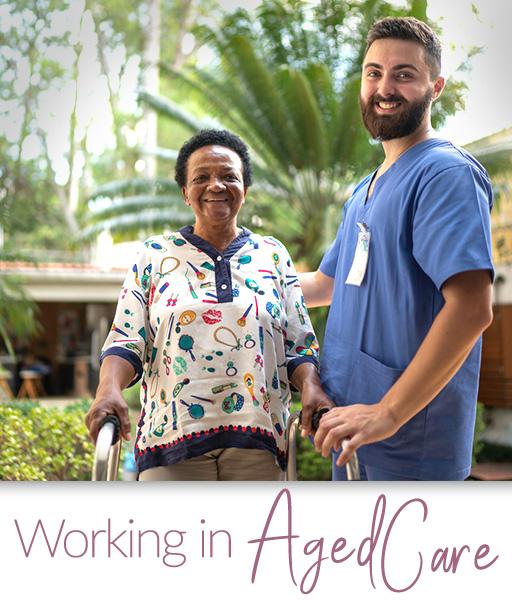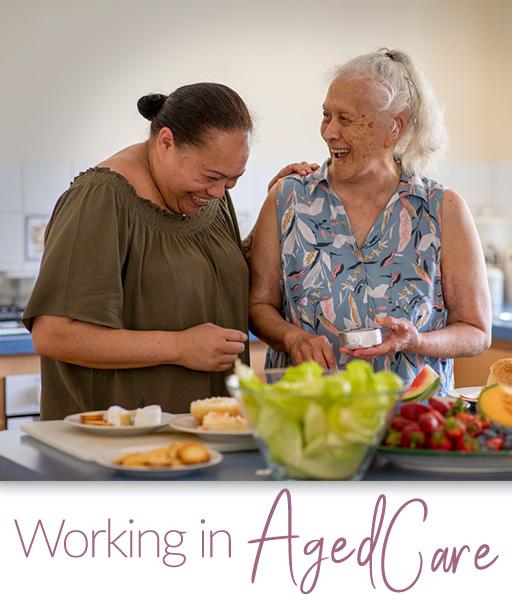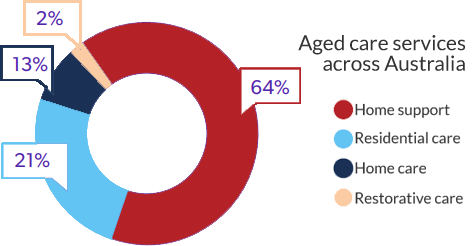Are you a caring person, who loves to look after others? Do you enjoy meeting new people, and hearing their stories? And most of all, would you like to work in a job where you're truly making a difference to people's lives? Australia has one of the leading aged care systems in the world, and with our ageing population — and people living longer — the demand for skilled aged care workers is increasing. In fact, aged care (together with disability support) is the second highest employing field in the country!
From providing individual support for older people in their own homes, to working as part of a team in a residential aged care facility, there's a range of work available, Whether you're looking for an entry-level job or making a career change, you're entering a field with fantastic opportunities that can offer you a highly rewarding and stable career.
What working in aged care can offer you
|
|
|
|
|
|
Aged care is also the kind of industry where you can continue growing your skills and knowledge to progress your career, or specialise in a particular area or type of work. Follow the links to find out more about the industry, job and career opportunities, and training options.
Industry information
- Fast facts: WA's aged care industry
- What are the main aged care services?
- Australia's aged care workforce
Jobs and careers in aged care
Do you need to skill up?
- Training options and pathways
- Fee-free aged care training: Infection control
- Fee-free aged care training: Job Ready skill sets
- Low fee aged care qualifications
- Pre-traineeships and traineeships in aged care
- School-based traineeships, and group training organisations
- Browse our list of aged care courses
- Looking for advice on training, jobs or careers? We can help!
Aged care — How we care says who we are
This video was created to highlight the importance of the aged care industry, and the industry's vision (as written below) to inspire people to want to enhance the lives of others through quality care.
We exist to inspire people to want to care,
enable people to properly care
and enhance life through care.
Because how we care for our ageing
is a reflection of who we are as a nation.

Fast facts: WA's aged care industry
- Aged care is part of Australia's largest employing industry category; Healthcare and social assistance. Aged care and disability support are the second highest employing occupations (following registered nurses in the number one spot)0.
- There's currently over 366,000 people working in aged care across Australia, and this number is expected to grow significantly. In WA, more new jobs are being created in the care sector than any other1.
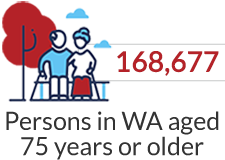 |
 |
 |
- WA’s population of people aged 85 and over is expected to grow by 43.3% over the next 10 years, which will result in a need for more skilled aged care workers. Demand for aged care services is growing particularly in regional areas, as more people are choosing to move out of the city in their later years3.
- Medical advances and changes in technology and patient care requires continuous training and skills development in order to provide best-practice care services. This also creates opportunities for specialising your skills in particular areas, for example; dementia care.
- Of a total population of 23 million, over 1.3 million older Australians currently receive some form of aged care and support services each year. The majority of these (over 839,000 people) receive in-home support, and almost 184,000 people are in permanent residential care2.
- In the year ending 2019, 15.9 per cent of Australia's population was aged 65 years or over4. The United Nations projects Australia's population for people aged 65 years and over will be 7.47 million6.
3 Bankwest Future of Business: Focus on Aged Care 2019
4 ABS 3101.0 Australian Demographic Statistics, June 2019
Useful links and information
- The Commonwealth Government Department of Health undertakes research on the aged care system and its performance
The impact of COVID-19 — Your safety at work
The COVID-19 pandemic presented many challenges for the aged care industry in 2020, and highlighted the importance of infection control procedures. As a result, the aged care industry has implemented stringent policies and processes to ensure the safety of staff. Workplaces are maintained to the highest possible standards, and extensive training — as well as personal protective equipment (PPE) — is provided to all staff to ensure they are able to protect themselves from the risk of infection at work.
What are the main aged care services?
For older persons who want to stay in their own home but need some help with daily tasks, or entry level care, the Commonwealth Home Support Program (CHSP) is available. Funded by the Commonwealth Government, the CHSP is an entry level home help program for people who are mostly — but not completely — able to live and cope on their own.
Services provided through CHSP include domestic assistance such as cleaning or clothes washing, personal care (eg; showering or dressing), and general social and wellbeing support such as taking the person out to community activities or to visit friends, or helping with shopping.
If an older person is no longer able to remain living independently at home, and/or needs care beyond what's available through in-home services, moving into residential care is an option to ensure quality of life. Residential care provides full 24-hour support for all aspects of a person's needs; from personal care (showering, toileting, dressing etc) through to nursing care (managing medications, monitoring health) and even specialist support such as occupational therapy as well as social and recreational programs for residents' emotional and mental wellbeing.
Residential care facilities — often referred to as a 'nursing home' — offer different levels of support as a person's needs change and grow. Some cater to a specific cultural group, others offer specialist care for people with conditions such as dementia or disability.
Residential care facilities often have a large team of people; there will be a mix of qualified (registered and enrolled) nurses, allied health specialists, and personal carers — the exact number of staff is regulated through The Aged Care Act 1997 which sets out the required ratio based on resident numbers. There's also a large team behind the scenes; from the people in administration through to cooks preparing meals and the housekeeping team.
For older people who need a higher level of care and support than what's available through in-home support, but still wish to live independently in their own home, home care can be an option.
The Commonwealth Government provides funding for home care packages, and these are offered via providers using the 'Consumer Directed Care' principles of service. This means the person can choose the type of home support they receive, when they receive it and who provides it. Alternatively, a person can pay entirely for home support services through a private provider who can offer a full range of services including complex medical care and therapies, and carers to assist with shopping and personal care.
Restorative or respite care is typically a shorter term aged care solution — for example; if a person needs support following a medical incident or surgery, or if a person's usual carer is not available for a period of time. The idea is that services provided through restorative care will enable the person to return to earlier levels of independence; delaying the need for long term care and support.
Restorative care is generally guided by a doctor, or social worker, in line with the person's individual needs. It may involve in-home care, or could require a short-term stay in residential care.
Community care services are intended to help people who need care and support for their emotional and physical wellbeing, helping to ensure that issues such as social isolation are minimised. Individual community care services may take place at an older person's home, or at locations such as a local hall or church, or a day centre.
Australia's aged care workforce
Currently employing over 360,000 people, aged care offers opportunities for everyone! Take a look at the following information, for a snapshot of workforce information.
The average age of aged care workers is 47, with most workers in the 45—54 age group. This is closely followed by the 35—44 years age group.
More younger people have been entering the industry over recent years, which is great to see. While age isn't a barrier to employment in aged care, it is the kind of work that requires some personal maturity and a bit of life experience.
Around 80 per cent of workers in care roles are female.
This is rapidly changing, however as more men are entering the industry!
Over 40 per cent of people working in a carer role have completed a Certificate III or IV vocational qualification, and around 15 per cent have a Diploma or Advanced Diploma.
Approximately 15 per cent of the workforce hold a degree or higher qualification — these are generally the qualified healthcare staff such as nurses and therapists.
"Clinical staff" describes members of the workforce who have completed medical or clinical training — for example; nurses or occupational therapists.
Around three quarters of Australia's aged care workforce are non-clinical staff.
Have you thought about the whole team of people that it takes to provide quality aged care services and support? In addition to carers and nursing staff, many other workers are involved — particularly in residential care.
From the chefs, cooks and nutritionists who prepare daily meals, the laundry and housekeeping team, through to the gardeners and others who maintain the facilities and the office and administration people — it takes a team! It's good to know these career opportunties are available — perhaps you enjoy working with elderly people but don't want a personal care or nursing role — you can look into other areas of work within the industry.
This short video highlights some of the different jobs that the aged care industry offers — you'll hear from people in different occupations and find out what training they've done, how they have established their career in aged care, and what they love about their job.

How do I get a job in aged care?
Now is a great time to consider a career in the aged care industry! Because there's a wide range of occupations within aged care, it's helpful to know about different occupations and the kind of work they involve. What will be a good fit with who you are and what you want for your future? Will you need new skills to get into a particular occupation or job?
Take a look at the following questions, to help get things started.
With such a range of jobs available in aged care, the first step is to decide what kind of work you would like to do. For example; do you want to work directly with clients as a personal care assistant? Or are you more interested in a less 'hands on' role?
It would also be useful to consider what kind of service you would like to be involved with, as the work environments can be very different. For example, do you like the idea of different clients that you visit regularly in their homes? Or is a residential facility where you can get to know a group of older people and experience a range of daily activities more appealing? Or perhaps you'd like to work in a specialised area; such as dementia care?
Finally, what level of work are you looking for? If you're just starting with an entry-level position, you can expect to be following an individualised care plan for each client to ensure that they are getting the care and support that they need, and working under supervision. If you already have some experience in aged care, perhaps you're looking for a job with more responsibility, or you may want to get into specialist fields such as dementia care or physical therapy.
Your answers to these questions will also help you determine whether you'll need to do some training, or get a qualification, for the job you want.
To learn more about jobs in aged care, good place to start is our occupational profiles but you can also take a look through the following websites.
- Take this quick career quiz to see what kind of role would suit you.
- View the occupation profiles on myfuture.edu,au (you'll need to register, but it's free!)
- Your Career: Occupation profiles search
- The Commonwealth Government's Department of Health website has useful information about the aged care industry
- For information about the rules for issues such as funding, regulation, approval of providers, quality of care and the rights of people receiving care; view the Aged Care Act 1997
- The Commonwealth Government's Institute of Health and Welfare has some useful information about people's care needs in aged care
If you're after a specific occupation or looking to make a career move then skilling up through training is the way to go.
Right now there's 180 qualifications with course fees reduced by half or more under the Lower fees, local skills program... and even better, there's an annual cap on course fees, so you can super size your study but only pay as little as $400 for the year if you are under 25 or looking for work!
Take a look at the Do you need to skill up? section for more information
These are both great options to kickstart your aged care career.
With a traineeship, you will complete a program of work and training over a period of time (generally one to two years). You are employed, and paid, during this time.
A pre-traineeship is a qualification that you complete at a TAFE college or private training provider, to give you some entry level skills and knowledge as a pathway to a full traineeship and employment
Take a look at the Do you need to skill up? section for more information
Because WA's aged care industry is rapidly growing, the demand for workers has never been higher! Most job opportunities are advertised online — here's some places to start your search.
There's also some companies who specialise in recruitment for the aged care industry. We recommend doing an internet search to find out more about what services they offer for jobseekers. And if you're on social media, there's several groups on Facebook and Instagram that regularly post job opportunities — do a search to find them.
Top tip: Sometimes the best approach is a direct one — most of the major aged care service providers operating in WA advertise job opportunities on their website, and/or their social media pages. Make a list of the companies you're interested in, and do an internet search to find them.
If you’re interested in an aged care career your local Jobs and Skills Centre can help with free advice on career planning and training to help you get there.
And if you've spotted a job you want to go for, they can help freshen up your CV and even help you put your job application together. Need some tips for job interviews? They can do that too!
Because Jobs and Skills Centres work closely with local employees and industries, they know where the jobs are and how you can get them. And they know what employers are looking for. There's 15 JSCs across Perth and regional WA, and all services are free. Call your local JSC on 13 64 64, or check our map to find your closest centre.
Am I suited to this kind of work?
Working in aged care will give you some incredibly rewarding experiences, but — as with all jobs — it will also present you with some challenges.
Whilst it's important that you have the skills and knowledge to do the work, it's equally important that you have the right personal attributes as well. Despite qualifications and experience being important, aged care employers consistently rate personal qualities as being most critical for the job.
Ask yourself... are you:
- a good communicator who enjoys chatting with people but is also an excellent listener?
- an honest and genuinely caring person with compassion and empathy, who loves to help others?
- patient and able to adapt yourself to other people's abilities?
- flexible and adaptable enough to handle changes and variety in your daily work?
- ok with providing personal care for others; including toileting, showering and dressing?
- reasonably fit, to handle the physical demands of this work?
- a generally positive person with a "can do" attitude, who enjoys working with people?
If you answered "yes" to most of those questions, you could be well suited to working in aged care!
What do employers look for?Capecare is an aged care service provider in South West WA, and is working with the State Government and the South West Development Commission to encourage people of all levels of experience and age to explore a career in aged care. In this video, Capecare talks about the kinds of qualities that they look for in their employees. You'll also hear some of their team members share their personal career experiences and talk about the opportunities available in aged care. |
Occupations in aged care
Aged care offers a range of different occupations and job roles, so it's useful to explore these so that you can decide on the kind of work you're interested in doing. We have over 550 occupation profiles you can browse through! To look for an occupation, use the keyword search option below, or visit our Occupation profiles page for other search options including an A—Z list.
Please note that the impact of COVID-19 is an unprecedented situation that will impact our ability to report accurate course information and employment trends at this time. Some employment trends and course availability information provided in occupation profiles may not be current.
Career stories
Are you looking at aged care for your first job — as a young person, or later in life ? Or maybe you're making a career move voluntarily or have recently lost your job, or you're keen to move into a different industry? The good news is that the aged care industry offers opportunities for all ages, and all stages.
Take a look at this selection of videos, to hear some personal career stories from people in aged care. And remember, you can get free training and career advice, and even assistance applying for jobs, from your local Jobs and Skills Centre!
Starting out
Caitlin started a Certificate III in Allied Health in Year 10, then did a Certificate III in Aged Care as a school-based apprenticeship in Years 11 and 12. Although at first she was not sure whether aged care was the kind of work she wanted to get into, Caitlan now enjoys it so much that she has decided to go to university to do a three-year Bachelor of Nursing degree so that she can become a registered nurse.
Caitlan is a great example of a younger person who has developed her skills, knowledge and maturity through training and experience and is now set on a fantastic career pathway.
Mature aged traineeship
Maria completed a traineeship in aged care, and loved the combination of training and the real hands-on experience of working in an aged care facility for great on the job learning. She even learned how to use a computer, for the first time. Maria is now a qualified aged care worker and loves going to work every day.
Maria says "I thought traineeships were for people who left school or in their teens, but it doesn't matter what age you are — you can still learn new things and have new experiences".
Career change after 20 years
Cyrlene had been working in administration for over 25 years when she decided to follow her heart, and her passion — making the big decision to resign from her job and pursue a career in aged care.
After completing her Certificate III in Individual Support (Ageing) qualification at TAFE, which she now says has changed her life, Cyrlene started working as a aged care support worker.
One of her goals now is to complete a Certificate IV qualification so that she can learn more and become more professional in her carer role.
From retail to dementia care
Leaving behind a 30-year career in the retail industry, Debbie set her sights on working in aged care — something she had always been interested in — and completed her Certificate III in Individual Support at TAFE.
Debbie says she's always enjoyed her dealings with older people — "They have such interesting stories to tell, they're funny and they really enjoy life," she says, and it was her experience caring for an older family member with dementia that helped her make the decision for a career change. Once she completed her qualification, Debbie did two volunteer shifts at a specialist dementia care facility... and was offered a job!
In this video, Debbie talks about her experience at TAFE as a mature-aged student.
Aged care nursing
Aged care is the fastest growing sector in nursing, with opportunities for nurses from all backgrounds to enjoy a diverse and rewarding career. Aged care nursing is delivered in a range of settings; from specialised hospital wards to rehabilitation centres and also in-home services and in residential aged care. Nursing roles have a clinical focus, and are responsible for the medical aspects of a person's care, but they also involve personal and individual support. Aged care nursing can offer excellent career growth as you can progress through higher levels and/or specialisations and even to supervisory or management roles. There's three main options for working as an aged care nurse; a nurse assistant, enrolled nurse, or registered nurse.
Assistants in nursing (AINs), or nurse assistants, support the nursing team but do not perform any clinical duties.
Under the supervision of a registered nurse, AIN tasks include monitoring patient safely by keeping an eye on patients who might be unwell, restless or confused; assisting patients to get in and out of bed and mobilised; helping with meal set up and feeding; personal care such as showering and mouth care; and some housekeeping work.
Working as an AIN is an excellent way to start your aged care nursing career.
An enrolled nurse (EN) has completed a Diploma of Enrolled Nursing through a TAFE college or private training provider.
ENs work under the supervision of a registered nurse, and their duties include observing patients; and measuring and recording health indicators such as temperature, pulse, blood pressure, respiration, blood sugar levels etc and reporting any changes. They also assist with personal care such as showering and bathing, dressing and personal hygiene.
ENs play an important role in supporting rehabilitation or exercise programs and encouraging patients to lead a healthy lifestyle.
A registered nurse (RN) has higher level responsibilities and clinical knowledge than an EN, and is responsible for assessment of patients, administration of medicine including via intravenous (IV), and specialised care. RNs may also work as a team leader or unit manager.
To become an RN, you must complete a Bachelor of Science (Nursing) or Bachelor of Nursing three-year degree at a university. Your study will involve theory units and clinical placements, otherwise known as practicums or prac.
RNs work with a high level of autonomy and are responsible for decision making for patients' day to day care.
Study pathways into nursing
Vocational education and training (VET) pathways are available if you're considering a career in aged care career.
- The Certificate III in Health Services Assistance (Acute Care) (HLT33115 ) is the qualification required to be an AIN. It covers medical terminology; anatomy and physiology and client care, and includes a work placement component where you will gain hands-on skills and experience working in a healthcare setting.
- The Certificate III in Health Support Services (HLT33215) is available as a traineeship, as a pathway into enrolled nursing.
- The Certificate IV in Preparation for Health and Nursing Studies (52831WA) is a great stepping stone between Certificate III qualifications such as a Certificate III in Individual Support or the Certificate III in Allied Health, and the Diploma level qualification that you'll need for enrolled nursing. This qualification has half price course fees, as part of the Lower fees, local skills program.
Visit the WA Department of Health website to find out more about nursing occupations
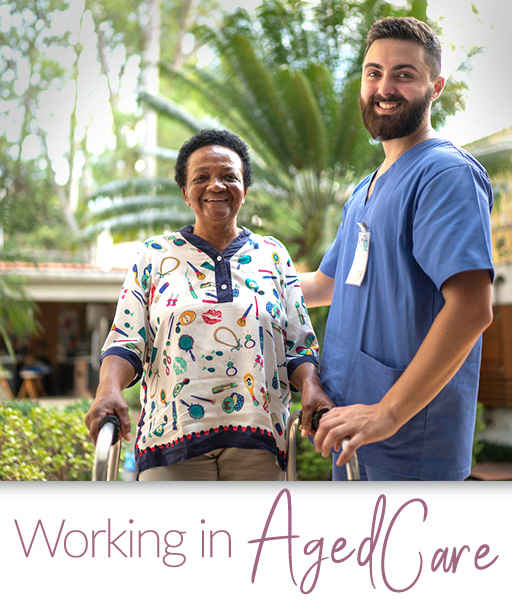

Do you need to skill up?
Training options and pathways
When it comes to getting a job in aged care, having skills and knowledge can really give you the edge over other jobseekers. There's a range of vocational education and training courses available at WA TAFEs and private training providers that can set you up to be job ready with the skills and knowledge that employers are looking for.
Once you have identified the type of work you are interested in, and/or the occupation you're going for, you can find a course or qualification that offers the skills and knowledge you'll need to be job ready.
There's a course or qualification for almost every job in aged care — from personal support workers and carers through to allied health professionals, and a range of support roles in areas such as administration, facility management and finance and everything in between! There's never been a better time to get into training; with fee-free courses and low fee training with course fees reduced by half or more for a range of qualifications through Lower fees, local skills!*
Free aged care training: Infection control
We have worked closely with WA's aged care industry employers to find out the types of skills needed right now and for future jobs, and developed free short course skill sets in infection control. Yes that's right, these courses are free for everyone!*
The free infection control skill sets have been developed from nationally recognised vocational training, and are now available from TAFE colleges and a selection of private training providers across WA — some are also available online.
The Direct Care skill set was developed in consultation with WA employers in the aged care and disability services sectors and the Community Services, Health and Education Training Council.
It contains three nationally accredited units of competency chosen to get you job ready for entry-level employment in aged care or disability support in Western Australia.
Completing this free skill set will be recognised by a Statement of Attainment. This will provide credit towards a range of qualifications where these skills are required, giving you great options for further study including the low fee qualifications in aged care, disability care and individual support that are available through Lower fees, local skills.
Please note: The minimum age requirement for the COVID-19 Direct Care skill set is 18 years.
The free Entry Into Care Roles skill set addresses the skills and knowledge required to provide entry level support and basic client care for a range of roles and purposes within the aged care and disability support sectors. The support provided in client care will be predominantly non-direct.
The skill set is comprised of nationally accredited units of competency.
Completing this free skill set will be recognised by a Statement of Attainment. This will provide credit towards a range of qualifications where these skills are required, giving you great options for further study including the low fee qualifications in aged care, disability care and individual support that are available through Lower fees, local skills.
Please note: The minimum age requirement for the Entry into Care Roles skill set is 18 years.
The Infection control (cross sector) skill set is designed to equip workers from all industries with the skills and knowledge to reduce the risk and transmission of infection, while carrying out routine work activities.
This training is suited to a wide range of workplaces including small, medium and large organisations; business environments, and where workers use shared facilities and interact with clients.
The skill set is comprised of nationally accredited unit of competency.
Completing this free skill set will be recognised by a Statement of Attainment. This will provide credit towards qualifications where these skills are required, including the Certificate III in Business, giving you great options for further study.
Free aged care training: Job ready skill sets
Not all jobs need a full qualification, and maybe you don't either — skill sets are the perfect solution to get ready for your first job, upskill to move into a different field of work, or update your professional skills and knowledge. These job ready skill sets have been developed in consultation with WA's aged care industry and businesses and employers to deliver fast track training that's focused on job ready skills. And best of all, they're free for eligible students!*
 | Take a look at the following information about the free job ready skill sets, then select the Skill Sets icon on the aged care course list to find out where they're available. |
Many individuals require support services to help them live an independent and fulfilling life — including people with physical or intellectual disability, older people, and vulnerable members of the community. This is highly rewarding work, but employers look for people who are job ready with basic skills and knowledge for entry level roles in one-on-one or group support settings, or for administrative role in a care facility. With the Provide Individual Support skill set, that will be you!
You'll learn about following a client's individual care or support plan to meet their personal support needs, how to comply with personal hygiene standards, maintain food safety, contribute to the cleanliness of food handling areas and dispose of food appropriately, prepare for and provide medication assistance and complete medication documentation, supporting a client to self-administer medication, safe work practices for the health and safety of yourself and your clients, and how to recognise potentially hazardous manual tasks and complete those tasks in a safe manner. An infection control unit is also included.
Further study pathways
This skill set provides a pathway to further study in the following Lower fees, local skills low fee qualifications.
- Certificate III in Individual Support
- Certificate II in Introduction to Disability Care (Disability pre-traineeship)
- Certificate II in introduction to Aged Care (Aged care pre-traineeship)
- Certificate IV in Mental Health
- Certificate II in Health Support Services
- Certificate III in Aboriginal and/or Torres Strait Islander Primary Health Care
- Certificate IV Aboriginal and/or Torres Strait Islander Primary Health Care Practice
- Certificate IV in Youth Work
- Certificate IV in Disability
Other qualifications for further study include the following.
- Certificate IV in Ageing Support
- Certificate III in Individual Support (Community care)
- Certificate III in Individual Support (Disability work)
There's many job opportunities in the field of community care, which includes health care support and specialist areas such as social support. The Work in Community Care skill set will give you a great starting point to get into the aged care industry, as it covers important areas such as first aid, communicating with diverse people, and customer service in a community care setting. You'll also learn to follow organisational infection prevention and control policies and procedures, including implementing standard and transmission-based precautions and responding to infection risks to ensure you're working safely.
You'll be job ready, knowing how to provide a first aid response to a casualty in a range of situations,· greet clients and exchange routine information to provide a triage service, work respectfully with people from diverse social backgrounds and demonstrate cultural sensitivity, communicate effectively with clients, colleagues and management, and use workplace technology.
Further study pathways
This skill set provides a pathway to further study in the following Lower fees, local skills low fee qualifications.
- Certificate II in Health Support Services
- Certificate II in Community Services
- Certificate III in Community Services
- Certificate III in Allied Health Assistance
- Certificate III in Aboriginal and/or Torres Strait Islander Primary Health Care
- Certificate IV in Ageing Support
- Certificate IV in Alcohol and Other Drugs
- Certificate IV in Community Services
- Certificate IV in Youth Work
- Diploma of Nursing
Other qualifications for further study include the following.
- Certificate II in Health Support Services
- Certificate III in Individual Support (Community care)
Low fee aged care qualifications
How would you like to get a nationally recognised and accredited qualification but pay only half-price course fees*? Or even less than half price! And how about a fees cap — that's right, eligible concession students will pay no more than $400 total for course fees in any one year*!
There's a range of qualifications in aged care, and related sectors, that have low course fees under the Lower fees, local skills program and they've all been chosen specifically to match up with the skills employers are looking for!
| Select the 1/2 Price icon on the aged care course list to see all of the low fees qualifications and find out where they're available. |
Traineeships — A great option for career pathways
Getting a job without any relevant skills or experience is not easy... right? While the aged care industry does offer some entry level jobs that don't require a qualification, you will be able to access a better range of job opportunities if you have some experience, skills and knowledge. That's where pre-traineeships and traineeships come in!
Pre-traineeships are designed to give you job ready skills and knowledge, and a 'taster' of working in a particular industry or job role — in this case, in aged care. The training component of your pre-traineeship is based on nationally accredited vocational education and training (VET) units of competency, and on completion you will receive a nationally recognised Certificate II qualification. This means that if you decide to grow your skills and knowledge through a higher level qualification after your pre-traineeship, you will receive credit for the units you have already completed so you can get that higher level qualification more quickly.
The Certificate II in Introduction to Aged Care pre-traineeship combines formal study at a TAFE college or private training provider with a work placement of around 100 hours where you'll gain hands-on skills and experience with clients in an actual workplace such as a residential aged care facility or group and/or community housing. And best of all - you'll pay only half price course fees!*
The employers who are supporting this program by providing work placement opportunities are actively looking for great people to join their team. During your work placement, you'll have the opportunity to show that you have not only the skills and knowledge, but also the positive attitude and kind and caring personality that they're looking for. At the end of your pre-traineeship, you may be offered employment directly or you may be offered a traineeship for a Certificate III qualification, which is fully paid employment while you study. With jobs growth strong in both aged care and disability support, your pre-traineeship qualification can open up great opportunities!
To find out more about the aged care pre-traineeship course, please visit our course list
Traineeships combine training with on the job learning — you are employed during your traineeship, so you earn while you learn. A traineeship generally runs over one or two years, and is usually for a Certificate III or IV level qualification. On completion of your traineeship, you will be awarded a nationally recognised qualification. There is no requirement to have completed a pre-traineeship before starting a traineeship; however, if you have already done a pre-traineeship you may receive credit for the units you have already completed, which could shorten the time it takes to complete your traineeship.
The Certificate III in Individual Support (Ageing) is the qualification currently offered as a traineeship for aged care in WA.
The course covers the skills and knowledge you would need to work in aged care support in a range of settings including residential and home or community based care. You'll learn about following individualised plans for person centred care to clients who require physical and emotional support, assisting them with activities of daily living, and with their general health and wellbeing.
As part of your traineeship, you'll do both theory and practical training — in the workplace, and at a TAFE college or private training provider — and undertake assessments in your workplace. Once your traineeship is completed, you will be awarded the Certificate III in Individual Support (CHC33015) qualification — a great start to your career!
To do an apprenticeship or traineeship, you must be employed. So how do you find an employer?
- Call your local Jobs and Skills Centre on 13 64 64 for free information and advice — because they work with local businesses and employers, your local JSC knows where the jobs are!
- You can go out and find an employer yourself, by searching for advertised jobs or contacting a company directly.
- There are a number of Australian Apprenticeship Support Network (AASN) providers in WA that are funded by the Australian Government to provide advice and assistance to help you find an apprenticeship or traineeship and organise everything to get you started.
You can find out more on our Apprenticeships and traineeships page here
There's also some great information on the Australian Apprenticeships website about finding an apprenticeship or traineeship, including some useful tips for how to approach employers.
Other options to kickstart your aged care career
A school-based apprenticeship or traineeship (SBAT) is an employment-based learning pathway for secondary school (Years 11 and 12). It combines off the job training at a TAFE college or training provider, and paid on the job training through a work placement, that leads to a nationally recognised qualification and can count towards your WACE.
An SBAT is designed to give you skills and knowledge in your chosen field or while you're still at school, to give your career a head start. There's also the Aboriginal school-based apprenticeship/ traineeship program, for Aboriginal students in years 10, 11 and 12.
To find out more about SBATs, you can visit our Still at school page here, speak to your school, or call your local Jobs and Skills Centre on 13 64 64 for free information and advice.
SBATs are available in a range of study areas, including many that are relevant to the aged care industry. However; please be aware that due to their young age, secondary school aged students may not be suitable to work in an aged care setting.
Another option is to find a traineeship through a group training organisation (GTO).
GTOs employ apprentices and trainees across a range of different industries. You are directly employed by the GTO, but they 'host' you out to an employer for work. This can be a great option as you may have the opportunity to work with more than one employer during your apprenticeship or traineeship — giving you a wider range of experience. GTOs are experts in hiring apprentices and trainees, and are regulated to make sure they are doing the right thing by their employees.
Step 1: Register with a GTO
You can look through our list of WA GTOs here, and check their information to find what industry/sector and/or type of apprenticeship or traineeship they specialise in. The next step is to register with the GTO (you can register with as many as you like) so that they have your details if a suitable vacancy arises.
Step 2: Recruitment process
You will have an initial interview with the GTO, so that they can find out more about the type of apprenticeship or traineeship you're looking for and discuss options. If you are suitable, the GTO will either offer you an apprenticeship or traineeship or let you know when one becomes available.
When you start your apprenticeship or traineeship, your GTO will help you prepare to meet your host employer. They will also provide any pre-employment training that's required; such as workplace health and safety, and the basic personal protective equipment (PPE) needed for the role.
After you start your apprenticeship or traineeship, the GTO will assign you a field officer who will be your direct contact point if there's any issues or if you have any queries about your apprenticeship or traineeship. Your field officer will also monitor your training and work, and check in to make sure that everything is going smoothly.
All aspects of your apprenticeship or traineeship through a GTO are the same as any other apprenticeship or traineeship — it's really only the actual employment arrangements that are different; ie you are employed and paid by the GTO rather than by the company where you're doing the apprenticeship or traineeship.

Aged care courses
Using this course list
- Use the Skills Ready filter options if you would like to search for fee-free or low fee courses.
- If you're looking for something specific, enter one or more keywords such as "personal care" or ''therapy"
- Use the options to narrow your search by level of qualification, training provider, industry or study area
- To find out more about a course, select its title and then select a TAFE or training provider from the list presented
In this course list we have included study areas that are aligned with the aged care industry but please note that not all courses presented in the list will be related to the aged care industry. If you would prefer to see only the aged care courses, please select 'Aged Care' from the 'Study Area' list.

Looking for training, jobs or career advice? We can help!
If you're interested in working in aged care, your local Jobs and Skills Centre can help with free advice on training and career planning to help you get there! And because they work closely with local employees and industries, they know where the jobs are and how to help you get them. Whether you need help freshening up your CV, writing a job application, or deciding what training course is the best option for you — your JSC can help!
JSCs are located through metropolitan Perth and regional WA, and outreach services are also available in regional areas. All services are free! Contact your local JSC to find out how they can help you.




